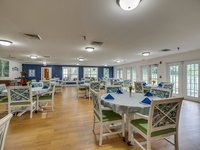Nestled at the foothills of the Blue Ridge Mountains, Boone offers beautiful views, a lively downtown, parks and shopping and plenty of local points of interest. Approximately 1,336 seniors call Boone home. Summers are mild and winters are cold, but the area gets around 204 sunny days per year for exploring. Crime is minimal and the cost of living is less than the national average, which makes the city an excellent option for seniors looking for a place to retire. The Watauga Medical Center is also nearby to provide treatment for accidents and injuries.
For seniors who want to retire in this city, Boones offers two assisted living communities, and six others communities are close by. The average monthly cost is around $4,000, but this can vary depending on the individual preferences of residents.
Hundreds of thousands of American seniors utilize assisted living, a figure that is only growing. For these seniors, assisted living combines residential housing,assistance in daily activities, and some healthcare. These communities also strive to provide an atmosphere that is comfortable and engaging for their residents… Read More >
According to the 2020 Genworth Cost of Care Survey, long-term residential care in Boone costs around $4,000 a month for an assisted living community. This is $200 more than the state average and $300 less than the national average. Two neighboring states, Tennessee and Virginia, have costs of $4,039 and $4,850, respectively. South Carolina communities are roughly $12 less.
The cost of assisted living throughout North Carolina varies greatly, with Asheville at $2,750 per month. Greensboro residents pay about $509 more than those in Boone, and those in Raleigh pay around $800 more. Fayetteville and Greenville seniors pay around $3,500 and $3,900 per month, respectively, while Wilmington has one of the most expensive monthly averages at $5,877.
Note: Data for Boone was unavailable, so data for the nearest city, Hickory, was used instead.
Medicare and most private insurance plans won’t cover the cost of grooming, housekeeping and other activities of daily living. The state’s home and community-based waiver helps low-income seniors pay for these services. Learn more about this waiver at our Assisted Living in Florida page, including what it covers, eligibility requirements and how to apply.
| Contact | Description | |
| Watauga County Project on Aging | (828) 265-8090 | The Watauga County Project on Aging encourages independence and promotes wellness for seniors in the county through a variety of programs and services. These services include nutrition, transportation, information and referrals as well as a medical loan closet. The agency also operates the Lois E. Harrill Senior Center that provides a safe environment for seniors to socialize, take part in activities and explore new hobbies. |
| High Country Area Agency on Aging | (828) 265-5434 | The High Country Area Agency on Aging supports older adults through direct services and resources. This includes health promotions, advocacy, disease prevention, caregiver support and nutrition. The agency also provides legal services to low-income seniors who need help with non-criminal issues such as consumer issues, income, healthcare, housing and long-term care. |
| AppalCART | (828) 297-1300 | AppalCART provides free-fare routes to low-income seniors ages 60 and older who need transportation to and from local senior centers, to and from medical appointments and for errands and outings. All rides must be scheduled at least a day in advance and all buses are wheelchair accessible. |
| North Carolina Long-Term Care Ombudsman (NCDHHS) | (800) 662-7030 | The Long-Term Care Ombudsman program serves as an advocate for seniors in long-term care. The ombudsman answers questions about long-term care options, residents’ rights and insurance and provides guidance on the power of attorney and guardianship. The ombudsman also investigates complaints of abuse and mistreatment and works to resolve the problem. |
| Watauga County Veterans Service Office | (828) 265-8065 | The Watauga County Veterans Service Office helps veterans, dependents and retirees locate state and federal benefits, including help with hospitalization, education, loans, pensions and burial allowances. For those in long-term care, the Aide and Attendance benefit helps cover the cost of home and community-based services to those who qualify. |
All long-term care facilities in North Carolina must adhere to the laws and regulations administered by the Division of Health Service Regulation. These standards apply to all aspects of care, including housekeeping and staffing. Learn more about these standards at our Assisted Living in Florida page.

